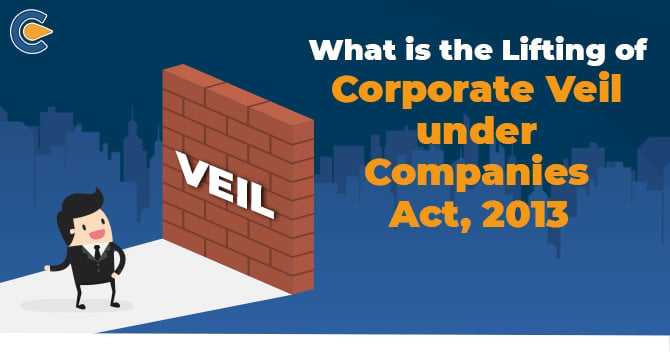Due to the increasing economic growth and changes within the corporate world, the corporate sector has seen many frauds, insider trading, and false statements. The lifting of corporate veil came into existence to protect the members from the company’s action. This article will discuss the Lifting of Corporate Veil under the Companies Act, 2013 and when the corporate veil is lifted.
Casting Light on Lifting of Corporate Veil under Companies Act, 2013
The Companies Act, 2013 clarifies that a company is a separate entity distinct from its members. But practically, it is an association of persons who are the beneficial owners of the company and its corporate assets. This fiction is created by a veil termed the corporate veil.
Here, lifting the corporate veil under the Companies Act, 2013 means ignoring that a company is a separate legal entity and has a corporate personality. Lifting of corporate veil as per Companies Act, 2013 ignores the separate identity of the company and looks back at the true owners who are in control of the company.
The separate personality is a regulatory advantage, and it must be used for a lawful purpose only. Whenever and wherever a fraudulent use is made of the legal establishment, the individuals will not be permitted to hide behind the curtain of corporate personality.
The concerned authority will break this company’s shell and sue the individuals who have committed such an offence. This lifting of the curtain is called lifting the Corporate veil under the Companies Act,2013.
Note- The Corporate Veil is a safeguard that protects the members from the company’s action. In Layman’s terms, if a company violates any law or incurs any liability, the members cannot be held liable. Thus, shareholders get protection from the acts of the company.
Relevant case of Lifting of Corporate Veil under Companies Act, 2013-Solomon Vs. Solomon and Co. ltd.
In the given case, Salomon established a company named “Salomon & Co. Ltd.”, with seven subscribers consisting of-
- Himself, His wife,
- Four sons and,
- One daughter.
Salomon was a secured creditor and shareholder of the company. There were other unsecured creditors as well. After a while, the company incurred losses and decided to wind up. During the winding-up process, the unsecured creditors claimed they should be paid before Salomon (as a secured creditor) as it was his company.
The basis on which Corporate Veil is Lifted under Companies Act,2013
Below-mentioned are the grounds on which Corporate Veil is Lifted-
Under Companies Act,2013-
Misstatement in Prospectus
In a case where the company’s prospectus is misrepresented, the company and every director, promoter, and every other individual, who authorized such issue of prospectus shall be liable to compensate the loss to every person who subscribed for shares on the faith of misstatement.
Also, these individuals may be punished with a jail term for a duration of not less than six months. This duration may be extended to ten years. The concerned company and person shall also be liable to a fine that shall not be less than the sum involved in the fraud but may extend to three times the amount involved in the fraud.
Misdescription of Name
As per the Companies Rule,2014, a company shall have its name printed on every official document, including (hundis, promissory notes, BOE, and such other documents) as may be mentioned.
Thus, where a company’s officer signs on behalf of the company any contract, BOE, Hundi, promissory note or cheque or order for money, that individual shall be liable to the holder if the name of the company is not properly mentioned.
Fraudulent Conduct
In case of winding up of a company, it comes out that any business has been carried on with intent to cheat the creditors or any other individual, or for any illicit purpose, if the Tribunal thinks it proper so to do, be directed in person liable without limitation to obligation for all or any debts or other obligations of the company.
Liability under the fraudulent conduct may be imposed if it is proved that the company’s business has been carried on misguiding the creditors.
Ultra-Vires Acts
Directors and other officers of a company will be held liable for all those acts they have performed on the company’s behalf if the same is ultra vires the company.
Failure to Return the Application Money
In case of Public Issue, if minimum subscription, as per the prospectus, has not been received within thirty days of the issue of prospectus or such other period as may be mentioned, the application money shall be returned within fifteen days from the closure of the issue.
However, suppose any the application money is not so repaid within such specified time. In that case, the directors/officers of the company shall jointly and severally be liable to pay that money with 15% per annum.
Additionally, the defaulter company and its officer shall be liable for a penalty of 1000rs/day during which such default continues or Rs 100000, whichever is less.
Under other Statues-
Apart from the Companies Act,2013, the directors & other officers of the company may be held personally accountable under the provisions of other statutes. For Instance, under the Income-tax Act, 1962, where any private company is wound-up and if tax arrears in respect of any income of any previous year cannot be recovered, every individual who was director of that company during the relevant preceding year shall be jointly and severally accountable for payment of tax.
Under Judicial Interpretation
While initially the court, based on the principle of the separate entity as well as a district corporate persona, refused to lift the veil of corporate governance, However, due to the rise of corporations and the ever-growing conflict between corporations and their different stakeholders, courts have taken a more pragmatic strategy and have lifted the veil of corporate governance.
It isn’t easy to record every court decision in which the veil was lifted. However, there are various circumstances where the veil of corporate character can be taken off, and the people who are behind the corporate entities could be found out and punished.
- Improper conduct and Prevention of Fraud.
- Formation of the Subsidiary company to act as Agent.
- Economic offence
- Revenue Protection
- The company used it for illegal purposes.
- Company ignoring welfare legislations.
- Company acting a mere fraud.
Conclusion
The Lifting of Corporate veil under the Companies Act 2013[1] helps ensure that corporate personality is used for legal purposes and not on fraudulent practices or illegal activity.
Read our Article:Audit under Companies Act, 2013: Explained











